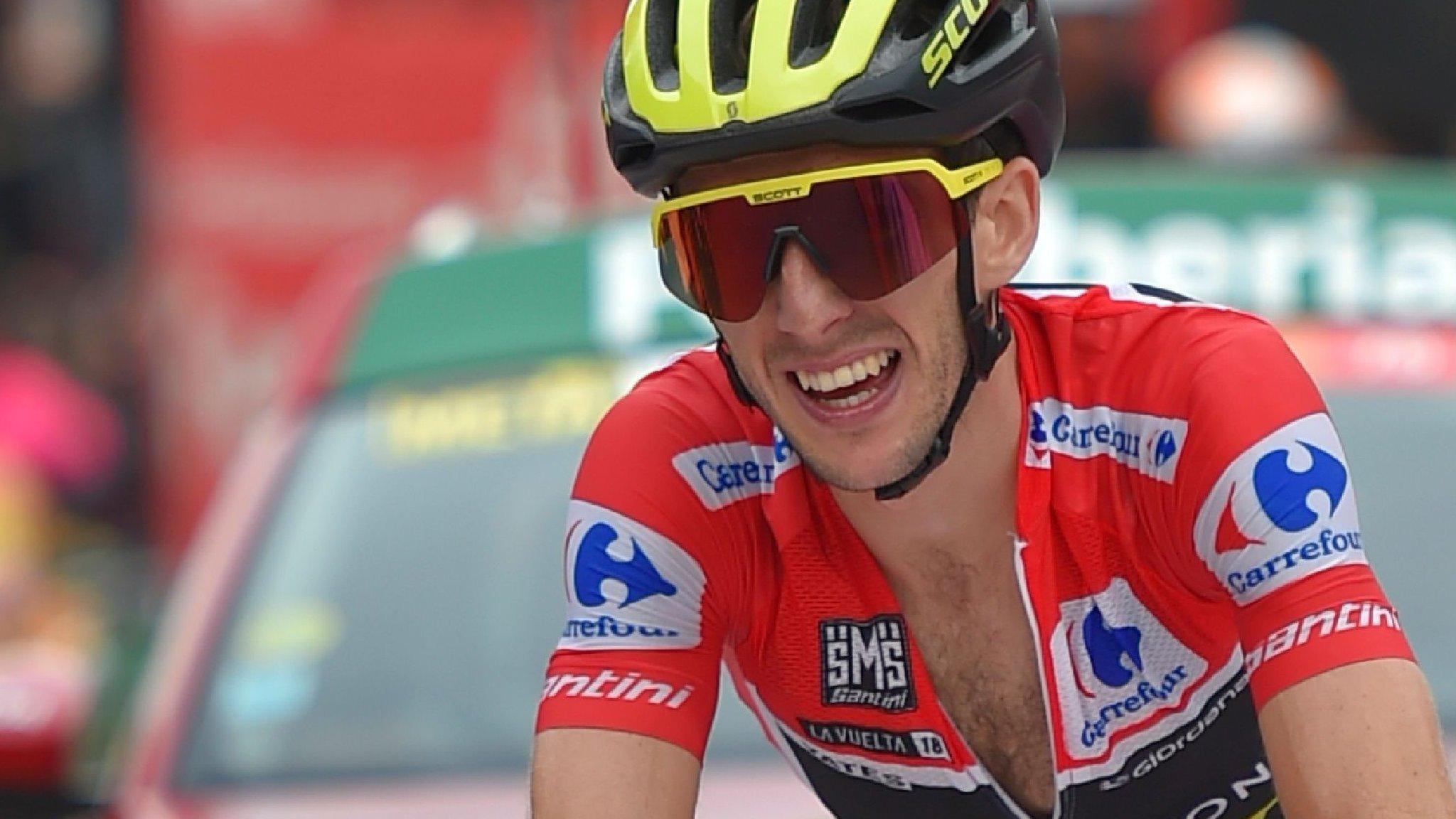Vuelta a Espana: How Simon Yates learned from bitter Giro d'Italia experience
- Published
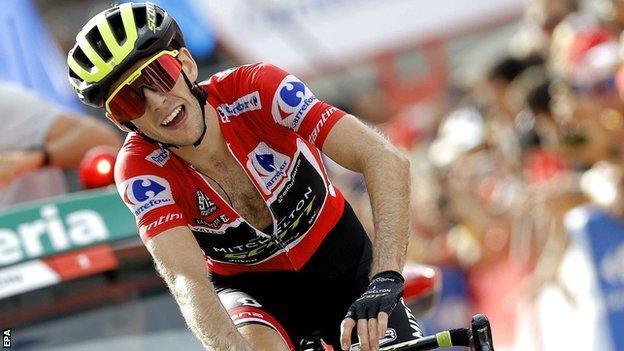
Simon Yates picked himself up from disappointment in the Giro d'Italia to win his first Grand Tour in Madrid
There are familiar semantic havens when sport brings failure rather than success.
We'll be stronger for this loss. You learn more from defeat than victory. This is all part of the journey.
Most of the time they ring hollow. If you're stronger for a loss, why not try to lose all the time? Why should failing to overcome problems teach you more than successfully working out the solutions? A journey can be enlightening yet it must also reach its final destination.
Sometimes they are more than cliche. Simon Yates' victory at the Vuelta a Espana has been buttressed by the strength of his Michelton-Scott team and eased by the absence of some star names and the troubled form of others. But more than anything else, it has come from experience, and not just the happy kind.
Yates came within two days of winning the Giro d'Italia in May. He held the race's pink jersey - the maglia rosa - for 13 days, won three stages and rode with consistent panache.
You couldn't miss him, all the way to the 19th stage where suddenly you couldn't see him.
As Chris Froome launched his famous solo attack on the Colle delle Finestre, Yates imploded, losing 38 minutes on the day and tumbling from first on the general classification to 17th.
A victory of attrition - not spectacular assaults
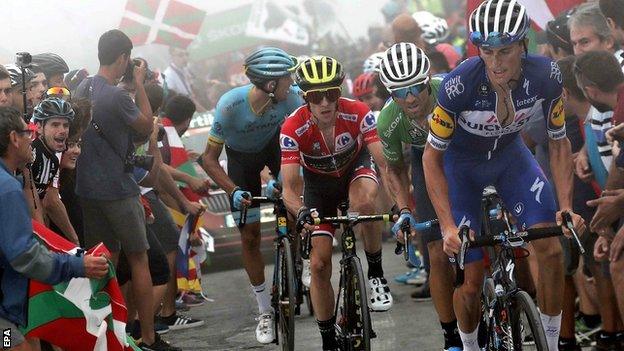
Simon Yates joined the elite names of his sport by winning the Vuelta
In Spain, he rode with the grizzled caution of a connoisseur. When he first took the leader's red jersey he was happy to soon cede it. As he has won it back he has done it not with spectacular assaults but with attrition and restraint.
At least once a day, he says, his team sport director Matt White has told him to ease off the throttle. He has listened every time.
Yates' tactics at the Giro were in part dictated by his rivals and by the parcours.
Up against Froome and Tom Dumoulin and with a long time trial in the final week, he felt forced to hunt every bonus second he could find before then.
His expectations shifted too; he had begun the race as support for team-mate Esteban Chaves, only for their divergent form on the road to lead to a rapid reassessment.
The Vuelta has been different. Froome and Dumoulin are absent, spent from their exploits at the Giro and Tour. Geraint Thomas is recovering from his own glorious graduation. Richie Porte, Vincenzo Nibali and Mikel Landa have all been brought low by injury.
But Yates is different too. The Giro is unpredictable, a race that throws fireworks at you, the maverick brother of the more controllable, corporate Tour. Yates rode it in character, attacking from close in, attacking from distance; chasing a team-mate, doing it solo. Dancing on the pedals, climbing with an easy grace and explosive acceleration.
He rode the Vuelta the way Alastair Cook approached his Test innings, the way Jordan Spieth won his debut Masters: with calculation, with restraint, with an eye on the long-term. The cruel three-week examination of a Grand Tour demands consistency as much as flair.
One-off displays of verve are fine. The battle-hardened ability to see off multiple attacks and rivals and conditions takes longer to learn.
'The Yates brothers stood out from very early on'
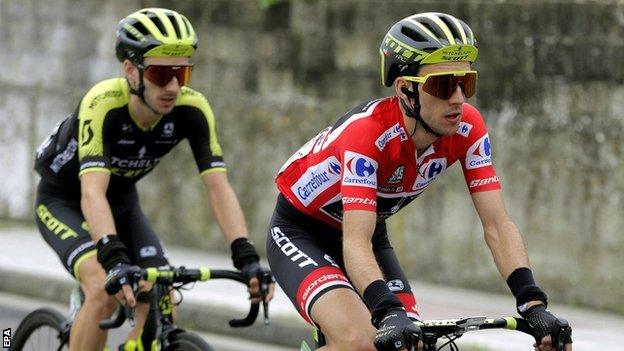
Adam Yates (left) rode in the shadow of brother Simon (right) in this year's Vuelta
Yates has soaked all those lessons up, just as he did after winning the white jersey for the best young rider at the Tour de France a year ago, in becoming world champion in the points race on the track in 2013, after finishing second at the Paris-Nice stage race earlier this year.
But the 26-year-old, like his twin brother Adam, has always been quick to absorb the education of the road.
"The first time I saw them they were 12, these two tiny little lads, and your first thought was, blimey, what are these two doing coming out with adults?" remembers Nick Hall, chairman of Bury Clarion cycling club.
"You soon realised why. That first ride was only 30 miles or so. At that stage they obviously lacked a bit of stamina, but even then you could tell they were two very talented lads.
"Talking to them, even at that age, you asked them what they wanted to do and they would say 'professional bike rider'. Other lads of the same age were playing football in the park and wanted to be Premier League footballers. For the Yates it was all cycling.
"They would sprint to the next lamppost and sprint against each other. In a friendly manner, but that competitive edge was always there between them. When they were in serious races they would race each other, but on training rides they were very competitive.
"When they started racing at Manchester velodrome, that made a massive difference to them. And they stood out among their peers there. They progressed to outdoor races and once again they stood out from very early on."
It's quite some trinity
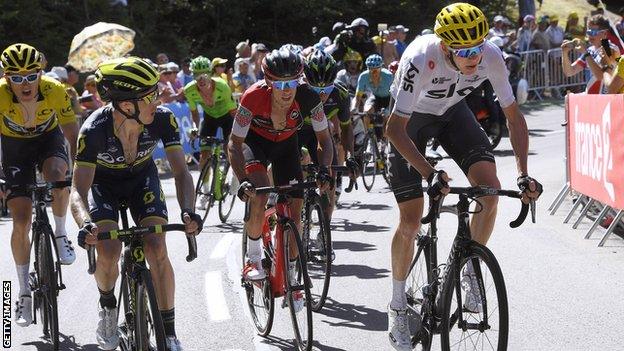
Geraint Thomas (left), Simon Yates(second left) and Chris Froome (right) during the 2017 Tour de France
Only twice before has one country made a clean sweep of all three Grand Tours in the same season: in 1964, when Frenchman Jacques Anquetil won the Tour and Giro and his compatriot Raymond Poulidor the Vuelta, and then in 2008 when Spain's Alberto Contador took the Giro and Vuelta and Carlos Sastre the Tour.
Never before have three different men from the same nation each won one apiece. And then came this golden year for British cycling in an era that had already brought unprecedented success: Froome charging late to snatch the Giro, Thomas indomitable across three weeks in France, Yates completing the hat-trick in Madrid.
It is quite some trinity. The Yates twins have previously been compared to triathlon's Brownlee brothers, two other similarly flinty siblings from across the Pennines in Leeds.
While both sets of brothers share a fierce competitiveness, the dynamics are subtly different. Alistair Brownlee is two years Jonny's senior and when the two have raced together in the Olympics he has come out on top both times.
There are only five minutes between Simon and Adam, the two taking different routes into elite cycling until both joined the Australian team that was then Orica-GreenEdge, and there has been little between them in terms of their palmares, at least until this week.
Totally at ease with pressure of competition
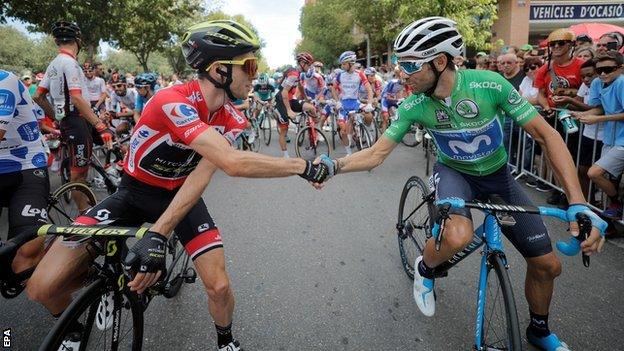
Simon Yates shakes the hand of home favourite and main rival Alejandro Valverde before the start of the 19th stage of the Vuelta a Espana
Both are more comfortable in the saddle than in front of a microphone. Both are totally at ease with the pressures of competition. Simon, throughout the past three weeks, has seldom appeared jittery.
"Simon and Adam take it all in their stride," says Nick Hall. "Even when they first turned professional, they raced against the top riders like Alberto Contador and Chris Froome like they were racing in a local club ride.
"Although they respected them, they were never overawed by them. They were always comfortable in that environment.
"They're both very chilled out. That comes from their mum and dad, John and Sue, although their parents can never watch them racing on TV in the same room. One has to go in the front room, the other in the back. They get too tense."
Vuelta win should make Simon a star
There is no fluking a Grand Tour. To win one, as with a tennis Grand Slam or golf major, requires repeated excellence. There can be no lucky long-range goal to nick it against the odds.
That should make the older Yates a star. He will be more of a marked man from now on. Teams will devise tactics to neutralise his strengths. His improvised moves will be watched with care.
But just as he has developed across the four months from the Giro to now, so he should improve again.
The disappointments of the final few days in Italy were not the defining narrative in his year. The Vuelta triumph may only be the start of the rest of his career.
- Published15 September 2018
